Related Research Articles

Graham Chapman was a British actor, comedian and writer. He was one of the six members of the surreal comedy group Monty Python. He portrayed authority figures such as The Colonel and the lead role in two Python films, Monty Python and the Holy Grail (1975) and Life of Brian (1979).
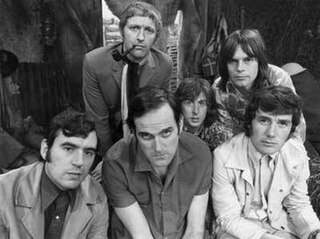
Monty Python were a British comedy troupe formed in 1969 consisting of Graham Chapman, John Cleese, Terry Gilliam, Eric Idle, Terry Jones, and Michael Palin. The group came to prominence for the sketch comedy series Monty Python's Flying Circus, which aired on the BBC from 1969 to 1974. Their work then developed into a larger collection that included live shows, films, albums, books, and musicals; their influence on comedy has been compared to the Beatles' influence on music. Their sketch show has been called "an important moment in the evolution of television comedy".

The "Dead Parrot Sketch", alternatively and originally known as the "Pet Shop Sketch" or "Parrot Sketch", is a sketch from Monty Python's Flying Circus about a non-existent species of parrot, called a "Norwegian Blue". A satire on poor customer service, it was written by John Cleese and Graham Chapman and initially performed in the show's first series, in the eighth episode.
The "Cheese Shop" is a sketch from Monty Python's Flying Circus.

"The Lumberjack Song" is a comedy song by the comedy troupe Monty Python. The song was written and composed by Terry Jones, Michael Palin, and Fred Tomlinson.

At Last the 1948 Show is a satirical television show made by David Frost's company, Paradine Productions, in association with Rediffusion London. Transmitted on Britain's ITV network in 1967, it brought Cambridge Footlights humour to a broader audience.
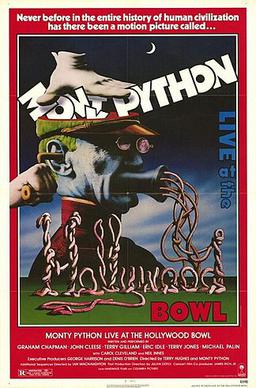
Monty Python Live at the Hollywood Bowl is a 1982 concert comedy film directed by Terry Hughes and starring the Monty Python comedy troupe as they perform many of their sketches at the Hollywood Bowl. The film also features Carol Cleveland in numerous supporting roles and Neil Innes performing songs. Also present for the shows and participating as an 'extra' was Python superfan Kim "Howard" Johnson.

And Now for Something Completely Different is a 1971 British sketch comedy film based on the television comedy series Monty Python's Flying Circus featuring sketches from the show's first two series. The title was taken from a catchphrase used in the television show.
"International Philosophy", commonly referred to as the Philosophers' Football Match, is a Monty Python sketch depicting a football match in the Munich Olympiastadion between philosophers representing Greece and Germany. Starring in the sketch are Archimedes, Socrates, Hegel, Nietzsche, Marx, and Kant. Palin also provides the match television commentary.
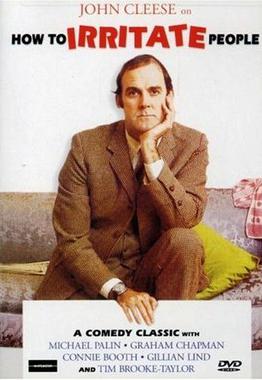
How to Irritate People is a US sketch comedy television broadcast recorded in the UK at LWT on 14 November 1968 and written by John Cleese, Graham Chapman, Marty Feldman and Tim Brooke-Taylor. Cleese, Chapman, and Brooke-Taylor also feature in it, along with future Monty Python collaborators Michael Palin and Connie Booth.

Monty Python's Fliegender Zirkus are a pair of 45-minute Monty Python German television comedy specials produced by WDR for West German television. The two episodes were respectively first broadcast in January and December 1972 and were shot entirely on film and mostly on location in Bavaria, with the first episode recorded in German and the second recorded in English and then dubbed into German.

"Argument Clinic" is a sketch from Monty Python's Flying Circus, written by John Cleese and Graham Chapman. The sketch was originally broadcast as part of the television series and has subsequently been performed live by the group. It relies heavily on wordplay and dialogue, and has been used as an example of how language works.

Monty Python's Personal Best is a miniseries of six one-hour specials, each showcasing the contributions of a particular Monty Python member. Produced by Python (Monty) Pictures Ltd., the series first aired on PBS stations between 22 February and 8 March 2006, although the Eric Idle and Michael Palin episodes were initially released by A&E on two Region 1 DVDs in 2005; the remaining episodes were released in late February 2006.
Edward Ian MacNaughton was a Scottish actor, television producer and director, best known for his work with the Monty Python team.

Parrot Sketch Not Included – 20 Years of Monty Python is a British television special dedicated to Monty Python, created to commemorate the 20th anniversary of the debut of the comedy group's television series, Monty Python's Flying Circus. Produced by Tiger Aspect Productions for the BBC, it was compiled by renowned British comedy producer John Lloyd and aired on BBC 1 on 18 November 1989.
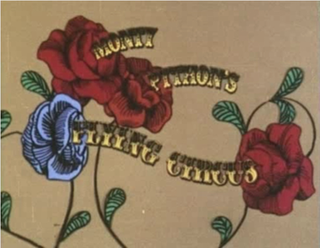
Monty Python's Flying Circus is a British surreal sketch comedy series created by and starring Graham Chapman, John Cleese, Eric Idle, Terry Jones, Michael Palin, and Terry Gilliam, who became known collectively as "Monty Python", or the "Pythons". The first episode was recorded at the BBC on 7 September 1969 and premiered on 5 October on BBC1, with 45 episodes airing over four series from 1969 to 1974, plus two episodes for German TV. A feature film adaptation of several sketches, And Now for Something Completely Different, was released in 1971.

Monty Python Live (Mostly) (also billed as Monty Python Live (Mostly): One Down, Five to Go) was a variety show by the Monty Python comedy group at The O2 in London in July 2014. Planned as a single performance for 1 July, it was expanded to 10 shows due to the high demand for tickets. It was their first live performance together in 16 years, the second without member Graham Chapman (who died in 1989) and the last with Terry Jones (who died in 2020).
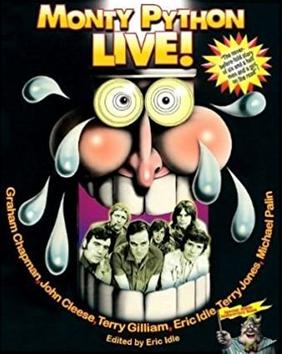
Monty Python Live! is a book detailing the various live performances of the Monty Python team between 1971 and 1980.
References
- ↑ See Ben Macintyre's review of Richard Overy, The Bombers and the Bombed: Allied Air War Over Europe, 1940–1945 (2014), in The New York Times Book Review, 23 March 2014, p. 16.
- ↑ Tomasz Dobrogoszcz, Ed., Nobody Expects the Spanish Inquisition: Cultural Contexts in Monty Python (Rowman & Littlefield, 2014), pps 118-89.
- ↑ "Monty Python's Personal Best: Series 1 - 2. Graham Chapman's Personal Best". RadioTimes. Immediate Media Company Limited. 22 February 2006.
John Cleese, Terry Gilliam, Eric Idle, Terry Jones and Michael Palin pay tribute to Graham Chapman, who died in 1989. They discuss their memories of him and select their favourite sketches in which he starred, including Colin `Bomber' Harris's solo wrestling match and spoof chat show A Quite Controversial Look at the World Around Us.
- ↑ Smylers (21 May 2013), ‘A Clump of Plinths’ Running Order , retrieved 7 October 2021